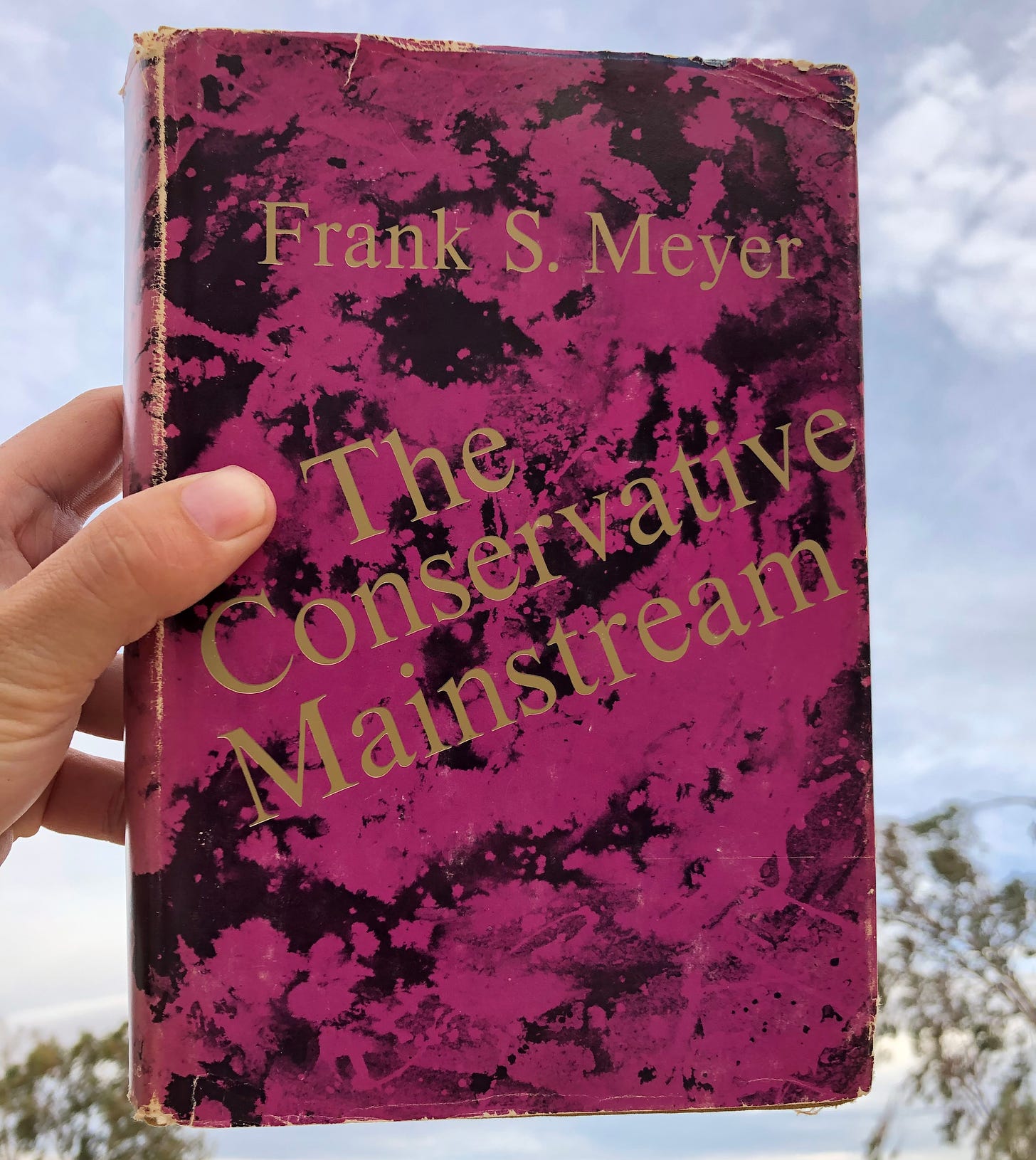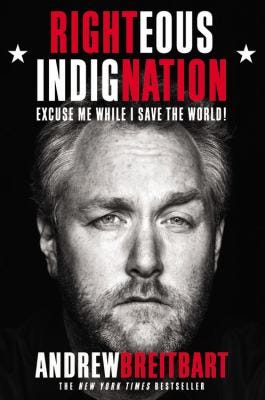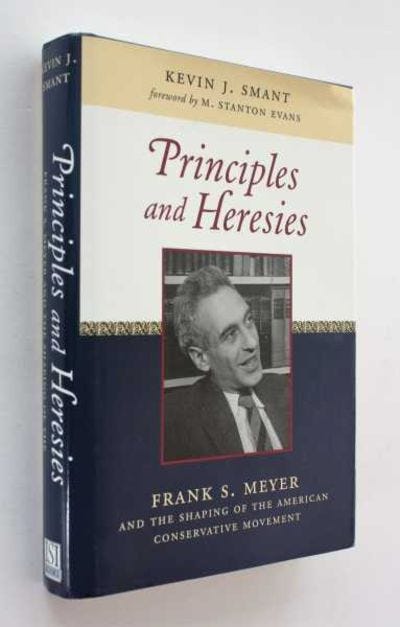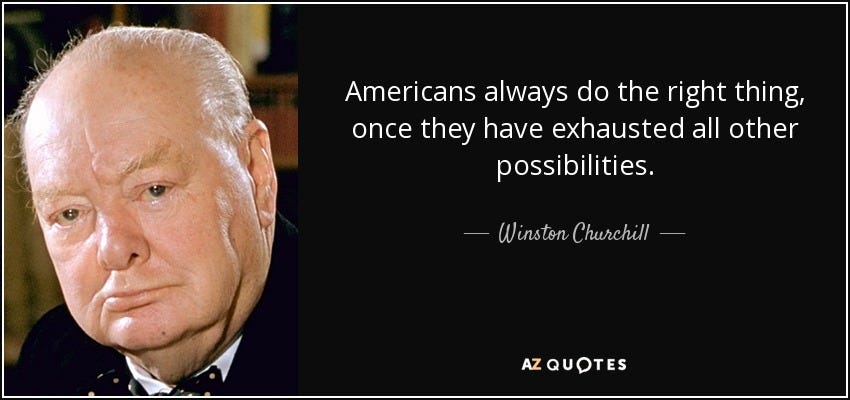For 70 Years There Have Been 3 Primary Ideological Zones on 'the Right,' Not 2
I offer a friendly dissent from a thoughtful Q&A post by an old friend and explain further why I no longer feel welcome in a movement I'd made my professional home for over a decade.

OK, first off, this is one of those pieces where I hit more points than I probably should and ramble on a bit longer than I really need to, but sorry, that’s what I’m feeling like today after an especially rough PTSD night in the wee hours of this morning, which provoked me to wake up 4 hours later than I usually prefer. While I usually heed Substack’s “post too long for email” warning this is one of those days where I just don’t care. I hope everyone enjoys my combination rant, pat on the back to a friend, and combination historical-contemporary ideological mapping.
I’ve been following and often working with
, a thoughtful writer, who for many years ran Right Wing News, the influential conservative blog he’d founded. John and I crossed paths while I was an editor at FrontPageMag/NewsReal blog and linked regularly to his blog; and then at PJ Media, where I published his very popular list articles for many years. He’s a decent guy bursting with creativity and a good heart.He too has now created a Substack, titled
, where he describes his goal, (my emphases of what I most sympathize with added):So, if it’s going to change, it’s going to take people like me writing articles about it, connecting with like-minded conservatives, and all of us pulling together as a group to try to figure out how to fix this mess our country has gotten itself into. That’s why my ultimate goal with this isn’t just to write articles, it’s to build a community full of people that understand the threat to the country and want to discuss the issues to figure out the best way for us to change things instead of getting stuck trading insults with recreational outrage loving morons on Twitter. I could very easily build a profitable conservative news website and traffic in outrage. I’ve done it before and I am confident I could do it again, but at this point, I have realized that the outrage merchants are part of the problem, not part of the solution. I’d rather walk the much more difficult path of building up a community via a subscription-based newsletter where we can grapple with the issues that are going to decide whether we save our country than to make a little more money before the country sinks beneath the waves.
I suppose I’m willing to contribute to John’s community and encourage those in it, even though I’m not as right-wing as he remains - I was also a bit more moderate than him when we worked together, but that’s OK, he’s not at all far out in crazy land or anything. I also don’t see the country in quite as dire straits as he and many others on the Right. In my view of history which I’ve developed, it’s largely always been this bad, and often worse. This is just the nature of what America is and who Americans are.
I’ve generally been more concerned regarding foreign policy issues and the situations in other countries around the world since generally beyond our borders the situation with human rights, war, crime, and poverty is far worse that what we deal with here. I see this as especially symbolized in the rates of antisemitism in countries around the globe, which vastly exceed those in America:
At the beginning of his about page he also cites one of our big shared influences, Andrew Breitbart, and his influential aphorism which I include at the beginning of each of my Antisemitism and Culture posts, and which inspired me in 2015 to shift from editing blog posts to editing novels:
Andrew Breitbart was absolutely right when he said that “politics is downstream from culture.” However, Breitbart didn’t go nearly far enough. In one sense or another, almost everything that matters is downstream from culture. That’s because a non-functional culture produces non-functional people.
John says much the same I do in my series, taking Breitbart’s warning to the next level: “I’d go a step further: Everything is downstream from culture. The cultures you embrace determine who you are and who you become. You become what you worship.”
So I couldn’t agree more with where John is coming from on all this, and welcome his more recent shift to a cultural focus. As I’ve discussed in my two last podcasts on idolatry, when people embrace cultures which worship nature - which worship death - as the Bible warns, their eyes cannot see, their ears cannot hear, and their hearts become hardened, immune to empathizing with the suffering of their fellow human beings:
John’s also continuing many of the traditions he started at RWN, including polling his audience for questions to answer. (Hey, I might steal this idea from him for GOTD!) I challenged him with several questions and he picked two of them to answer! Check it out:
The two questions of the many I left for him which John chose to answer were about his recent music tastes - he revealed the 20 songs he’d most listened to this year - and his thoughts on how the media had changed over the last 20 years from when he’d started RWN. I’ll note that one of his favorites looks to be one of the greatest rap songs of all time, which I also appreciate a lot too and included in this post as I was considering Generation X’s greatest musical tallents:
Regarding media change, John made one of his famous lists in response, noting “7 Ways the Media Has Changed Since I Got Started in the News Business in 2001.” I don’t have any disagreements with his points, and especially agree with 2 and 7:
2) The conservative media today is several orders of magnitude less independent, more corporate, and more profit-driven than it was back then.
…
7) People across the board cared a lot more about being accurate than they do today. Getting a story wrong was a much bigger deal back then.
These are so spot-on and I’ve seen it happen clearly myself too. I think part of the reason why so few people across ideologies don’t care about getting the story right anymore is that with today’s technology if you get something so egregiously wrong then it’s so easy to just delete the story and move on or quietly alter it without acknowledgement to correct any “errors.” Also: most people just don’t care. The culture around professional expectations around blogs and social media is so much lower than how I was trained as a print journalist during the 1990s and early 2000s. It used to be that if someone plagiarized or made stuff up then it would be the end of the writing career. Now so often I’ve seen time and time again that such people “fall up,” getting even better jobs than they had before, especially in “conservative” media.
But it’s really the combination of the two which has personally wounded and infuriated me the most. The conservative critique of the mainstream media’s “liberal bias” just doesn’t have teeth anymore.
I mentioned previously how John and I both knew and were inspired by the late Andrew Breitbart, who tried to popularize the idea of “citizen journalism” - that while the corporate left-leaning media could no longer be trusted to follow journalistic principles and ethics that now we on the Right could do that. But that didn’t happen at all. Right-wingers chose to just keep being opinion pundits and clickbait “content creators” rather than to learn how to do the hard work of real research and shoe leather journalism. Regurgitating conventional wisdom opinions that your audience wants to hear is much more rewarding professionally than doing the hard work to journalistically get a story right and provide new facts for people to debate. I know this clearly first hand - writing some op/ed, film review, or an opinion-driven blog post like this is infinitely easier than the hard new journalistic stories I do which require interviews, careful research, and precision in getting people’s quotes exactly right.
And BTW, let’s name names. Who is primarily responsible for conservative media becoming “less independent, more corporate, and more profit-driven”? Fucking SALEM MEDIA. They’re the ones who bought up one popular conservative website and media enterprise after another, homogenizing them to their far right, fundamentalist Christian approach as they went along, purging them of principled, independent thinkers.
And they’re the motherfuckers who are largely responsible for so many right-wingers dying from Covid because they refused to be vaccinated based on misinformation. I’m always going to say it and always be angry about it: Fuck Salem Media. Seriously, just about every time I reference that evil fundamentalist pseudo-Christian media company it’s going to be proceeded by some combination of F-bombs and perhaps other obscenities. Because what they did and what they are is fucking obscene and if you’re not as pissed off about it as I am then you should be. Congratulations for not having any right-wing or fundamentalist Christian friends now rotting in the ground because they trusted their beloved “conservative media,” because I was not so longer. RIP Tamara.
And, BTW, fuck anyone and everyone working for them who wants to pretend this evil company didn’t do what it did all throughout the pandemic. The company has over 1300 employees and as far as I’m concerned they might as well all be working Vladimir Putin’s internet troll farms of Qatar’s Islamist-promoting Al Jazeera propaganda TV network - what they put out was even more poison to America than the disinformation our enemies shoot into our media bloodstream.

Anyway, I did disagree with one point John made and decided to offer a dissent in the comments which I’ll reproduce and expand on a little here. And BTW, this is an important subject that I’ll unpack much more in my premium subscriber Joy of Political Sects essay series for my developing political ideology guidebook.
It’ll go across six different pieces picking it all apart, Currently planning on “A is for Anarchism,” “C is for Conservative Anti-Communism,” “H is for Hawkism,” “O is for Old-Right Paleo-Conservative Antisemitic Conspiracism,” “T is for Tea Party Breitbartism,” and “U is for Ugly American Bannonite Populist-Nationalism” each exploring different aspects of these themes both historical and modern. Check out the first two installments in the series here and I’ve got 2 more premium essay posts here in development now:
Here are also my preliminary research posts for “A is for Anarchism” which will dig into the similarities between Noam Chomsky/Howard Zinn’s far left anarcho-syndicalism and Murray Rothbard/Ron Paul’s far right anarcho-capitalism:
OK, here we go with my answer to John, now expanded and revised a bit for this post:
While I don't agree with everything John’s written here, I do with much of it. However, I see one point in particular where I differ:
"To begin with, I think of the Republican Party as being split between a populist and an establishment wing that have a few marginal differences in their philosophical views, but some significant differences in what they prioritize.
Although Reagan was much more ideologically principled than Trump, both of them came out of the populist wing of the Republican Party. So, while there's definitely an ideological gulf between Reagan and Trump, there was probably an even bigger one between say Reagan and W/his dad/Dole/Romney/McCain."
I strongly disagree that the Right - and by extension the GOP - are only split between 2 sides, a populist side and an establishment side, nor are these differences at all "marginal" philosophically. They are MASSIVE. Think about it: was the difference between Eisenhower and the John Birch Society which accused him of being a secret communist “marginal”? Was the difference in our blogging golden age between the WorldNetDaily bastards pushing Birtherism and homophobia “marginal” compared with Andrew Breitbart pushing back against their conspiracy BS and welcoming LGBTQ people into the conservative fold?
In my experience and overly obsessive analysis I more see it breaking down into 3 primary camps, though even within them there are different factions, personality cults, and tendencies. But this seems to be the general “lay of the land”:

1. The "soft" "squishy" center-right which embraced Big Business and Republican partisanship
This tendency gradually shifted from corporatist "Rockefeller Republicanism" in the 1960s to corporatist neoconservatism by the 1990s and early 2000s. This is the Bush family, the Romneys, Irving and his son Bill Kristol, Fox News, and so forth. The Bulwark today. This faction tends to most represent how the Republican Party has long been mostly controlled by business interests and the East coast elite going back to its founding in the 19th century.

2. The principled "hard" activist “conservative mainstream” which combined anti-communism, hawkish foreign policy, libertarianism, and social conservatism.
Frank S. Meyer (pictured above on the back cover from the book collecting his National Review columns published in 1969, with the included bio below) was the primary theorist who created this "conservative mainstream" ideologically, by balancing what was once called "traditionalism" (social conservatism) against what was once called "individualism" (libertarianism) and gluing them together with anti-communism. What is often described as “the three legged-stool of conservatism” goes back to him. He’s my favorite conservative philosopher - a simply wonderful writer - and classic ‘50s-early' ‘70s ideological operative. I’ve long regarded him as one of my career models. (His only major blindspot - which extended to the whole National Review crew as well as just about the whole 1960s Right - was that he really screwed up in his responses to the Civil Rights movement. Major failure there - which in a sense echoes how today’s right-wingers largely aren’t concerned about racism at all, more worrying about fuckin’ “CRT” and white people’s feelings being hurt hearing about the history of racism in this country.)
This biography of Meyer is first-rate in telling both as his story and of the conservative movement he was so crucial in shaping:
This wing of the Right is William F. Buckley, Jr., National Review, Barry Goldwater, Ronald Reagan, and was the primary ideology of the Right and the GOP in the 20 years following Reagan. It was both a reaction to the squishy establishment and the nut-job far right conspiracies, trying to find a middle-ground principled anti-communist activism between the two.
The only high up political figure I see still adhering to it today is John Bolton, who I have long regarded (since at least 2010 or so) as principled and “fuckin’ badass” in his willingness to say straight what he thinks. I wanted him to be the GOP nominee in 2016, and he’s the only Republican I can think of who I’d still vote for in 2024”:
Media-wise it’s the Dispatch, Jonah Goldberg, and David French today. I’d also still include my longtime colleague Ben Shapiro in this camp too, though I’ve not been a fan of the more populist-nationalist bent from most of his fellow Daily Wire podcasters. But Ben and his co-CEO Jeremy Boreing still strike me as decent guys. Them and the Dispatch are among the few conservative publications I’d still feel comfortable supporting with my writing submissions. (I suppose The Bulwark too I’d contribute to also, even though they’re much more neoconservative than I prefer.)
3. The authoritarian-sympathizing "Far" populist-nationalist-conspiracist right which indeed has genuine “fascist” tendencies.
This is the isolationist conservative movement of the 1930s and 1940s, before Buckley and anti-communism came along in the 1950s. It's the John Birch Society, whose ideology has proven way more influential and resilient than I first realized when John and I began collaborating over a decade ago. It's been reinvented by the antisemite Pat Buchanan as "paleo-conservatism" and the antisemite Ron Paul as "paleo-libertarianism." And now it's been reinvented into Trumpism which is largely one and the same with the pro-Putin wing of the Right. (Both Paul disciples and Buchanan disciples were among the very first to jump on the Trump bandwagon.)
Now, when I had my ideological shift away from the left from 2007-2010, I analyzed all this stuff really carefully for years because I realized quickly that these 3 different ideological camps had totally different philosophies and were largely only held together first by anti-communism and then by the “negative partisanship” of hating the Democrats more than each other. There were so many different activists and philosophers and professional ideological entrepreneurs that I realized I couldn't embrace them all, I had to pick my principles and then make my choices of who was principled and legitimate, who was just out for money and fluffing up corporations, and who was totally crazy. (I soon realized that Ayn Rand for example was in this last category…)
I ultimately picked the hard right Reaganite libertarian-conservative hawk camp, partially because I saw counter-Jihad and counter-Islamism as a replacement for anti-communism. I had become convinced that a hawkish foreign policy to defeat America's enemies had been proven right by history and that it would still work today. I still hold those views still - I remain hawkish as hell and every bit as opposed to the antisemitic, genocidal Islamists as I've ever been. (With the small caveat that the Jihadists and Muslim Brotherhood had a terrible time in the 2010s so they're just not quite the threat they were 10-15 years ago. I'm not as worried about them overall as I used to be, though they're still a threat, especially Iran, which I regard as equivalent in both its evil and danger as Nazi Germany.)
But at this point Reagan and Buckley are dead and many people have made the same analytical error which John articulates here:
"Let me also add that as much as I loved Reagan, I have long thought the Republican Party needed to move past his agenda. The reason being the world isn't the same as it was in 1980. There are new challenges, new realities, and one of Reagan's biggest issues was defeating the Soviet Union, which he succeeded at."
I do think the world is largely the same fundamentally as in 1980. (And not even all that different from how it was 500 years ago or in Biblical times!) Know why? There are still tons of evil, godless, authoritarian slave states all over the planet which threaten free peoples and free states.

And Russia is still one of them. Here's another thing I learned in my pawing through various right-wing philosophical books and histories: Russia itself was always the problem, not just the USSR and Communism. Russia was a terrible, evil country both BEFORE the Soviets took it over, and AFTER the Soviets took over. That sad, frozen wasteland has never valued freedom for its people like we Americans do. It has always been essentially a depressing, alcoholic slave state ruled by a czar with an iron-fist.
And it still is today. Putin has oppressed his people for decades and now is committing genocidal war crimes in Ukraine. And so many Americans just don't care. They think the world stops at the US's borders and we shouldn't be concerned with anything but our country's own domestic affairs. It’s a fucking stupid, amoral worldview that annoys me to no ends because it has been so endlessly refuted by history, but of course each new generation has to be dumb enough and so self-obsessed to embrace it again.
And Putin's not the only authoritarian threat at all. There are still Iran, North Korea, and China to name a few others. Hawkish Reaganite foreign policy which doesn't tolerate authoritarian bastards waging imperial wars of conquest wasn't something that became obsolete once the Cold War was one. It is a perennial philosophy, time-tested by history. We needed it before World War II and we need it still today. This approach to the world was relevant in Moses' time and in the medieval era. It always is relevant because the evil and cruelty of human nature remains entirely consistent throughout our species' history.
But alas, the polls are more than clear: the #AlwaysTrump populist-nationalist-conspiracist ideological tradition has come now to dominate the whole Right and has taken over the GOP as well as virtually all of right-wing media. I blame social media and the internet more broadly for it. It used to be that these sorts of voices were confined to tiny, obscure little magazines and newsletters at best. Nowadays they've had nearly 30 years of having an equal seat at the table with everyone else. And because of the nature of their narratives, the algorithms of social media are biased in their favor since social media favors emotionalism, provocation, over-the-top rumors, and trivial gossip, etc.
OK, I should probably stop my ranting.
Perhaps this puts into more context why I no longer regarding myself as really a right-winger anymore and have shifted more toward focusing on Zionism, an ideology which the mainstreams of both parties embrace. It's only on both the Far Right and the Far Left where you find people crazy and hateful enough to be anti-Israel.
So does this make sense to everyone? Any questions or disagreements? Please sound off in the comments or you’re welcome to submit your own post with your own map os “the Right” as you see it.












It wasn't too long I read all of it and enjoyed reading it. It lines up with my observations as well.
Liberals often times falsely think conservatives are a monolith. I knew this wasn't the case because I at around 11 years old took an interest in politics and because none of the adults in my life were willing or able to talk to a child about politics I somehow found conservative talk radio, which was at the time the only form of "intelligent" political discussion I could find.
I few years after getting really into the likes of "Michael Savage" and his Paleo-conservatism I realized that he was skewing and stretching the truth or downright lying a lot. So I jettisoned those views and began to hate that worldview.
However I did noticed that Michael Savage was a lot different than say George Bush. This is often expressed in the media and by pundits today as "establishment" and "anti-establishment" this is unhelpful especially because the "anti-establishment" is fully the establishment now.
Really you hit the nail on the head perfectly by describing three factions with ideological differences that matter. It's an excellent way of looking at US conservatives in a way that makes sense, that isn't dismissive. I think more liberals should know that there are different types of conservatives. Just as conservatives should know that the left is probably even more fractured.
I put myself in the "center-left" but when you force yourself to see different perspectives and weigh the different sides and arguments it is kind of hard to categorize yourself fully. No honest person is ever going to fully get behind one political party on every issue. Especially in the US where it's a dichotomous system. Two-parties are insufficient to really capture what people think on an individual basis. Yet there is no real room for a third party in the US system, leaving people having to choose.
I honestly wish the Republican Party offered a better alternative and represented conservativism as a political ideology better than they currently do. Right now the Republican Party is in a sad place. For much of US history they were the party of Civil-Rights and responsible for forward progress.